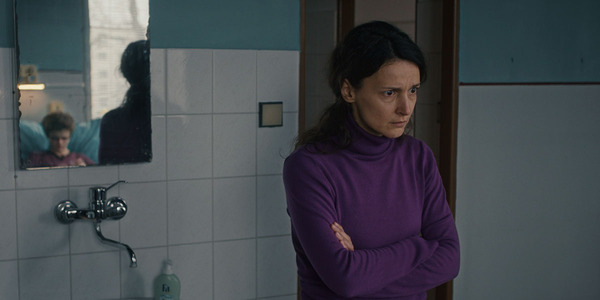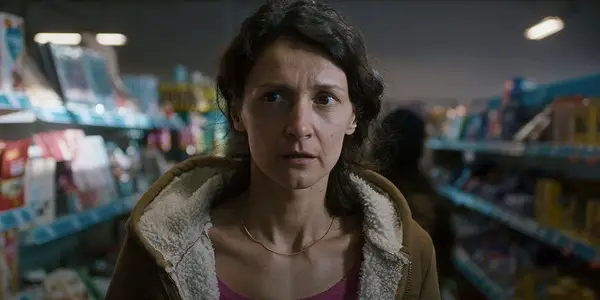Toronto International Film Festival 2022: Interview With Director Michal Blaško Of VICTIM

Wilson is a cinema enthusiast based out of Toronto, Canada.…
Crafting a striking debut feature film with Victim, Michal Blaško demonstrates himself to be an astute filmmaker with bounds of potential. Utilizing long takes and creating feverish intimacy on a grander societal landscape, the film deals with the aftermath of a Ukrainian teenager who was supposedly attacked by a neighbouring Roma student. Blaško spoke with Film Inquiry about the film during its presentation at the 2022 edition of the Toronto International Film Festival.
Wilson Kwong for Film Inquiry: Can you start off by talking about how the story for Victim came about?
Michal Blaško: The genesis of this project came during my second year of school I did a film called Fear, which screened at San Sebastiàn. After that, I was contacted by Jakub Viktorin, a producer of Victim, and he asked me if I had a story for a feature that he can be involved in. We knew each other for a long time, but I had nothing. But a year later, I started to profile a story. But in the beginning, it was really just a story about someone who says something, starting something that wasn’t right. And then Jakub Medvecký got involved and we started to develop it, making the main character a minority and then adding a second minority as well
So did the genesis of the story come from an actual real life event?
Michal Blaško: Actually, the main idea came from several stories, involving politicians spreading news not only through a hoax or fake news media, but also through national media. And there were also demonstrations involved. So we took these common parts to build this universal story, and that’s why the story isn’t situated in a concrete city, and it’s more of an anonymous city.
And for viewers like me, who aren’t necessarily well versed in the region’s sociopolitical situation, how prevalent is what you’re depicting in this movie?
Michal Blaško: The mood or atmosphere of how society views the Roma minority is very similar to how we interpret things in the film. Because they are not a popular minority and most of them still live in poverty, there’s higher criminality in those parts. So it’s easy for people to be against them, but it’s a system problem. The politicians are not trying to help with this problem either, so that’s why in the film, it was logical that the boy blamed the Romas because you blame the weakest. And it was easy for everyone else to trust him and believe that he was telling the truth.

What’s also interesting in the film is that it really plays with the idea of portraying a victim, and the idea of who the victim is really changes throughout the film. Can you talk about how you approached that concept in the film?
Michal Blaško: That was actually also one of the main motives with Fear, the idea being who the victim is in the beginning isn’t always a victim in the end. And we wanted to portray the idea that when there is someone who is a manipulator, there will then be a victim. So you have the neighbour’s son being a victim, but Irina (the mother) for me is also a victim because she trusted her son and suddenly is in a bigger problem. It was something we worked out through the whole writing process.
The scope of the film is also unique in that it starts off small, and could have easily transformed into something bigger, and does in a way, but you maintain the smaller scale throughout.
Michal Blaško: From the beginning, we wanted to keep the balance of a film about a mother and a son, and also between them and society. And we knew that if we put in a lot of social or news media, we would lose the relationship between them. So that’s why there is the mayor who is a portrayal of the political side of things, and we have the young man Sielski, who is someone who is an opportunist and might have an interest in politics too. So these are the individual persons who portray something bigger in the story.

Utilizing so many long takes also plays into how the story is presented. Can you talk about how the shoot was, and how you prepared your actors and crew for this?
Michal Blaško: Each scene was one shot, so it was pretty difficult. It was difficult for her (Vita Smachelyuk) because a year and a half before the shoot, she had to learn Czech because her character needed to speak fluent Czech. We did about 22 to 27 takes per shot, so it was maybe frustrating for her because sometimes she did everything well, but something went wrong technically or with the choreography. But what was great was that we had a lot of time to prepare. One year before the shoot, myself, the architect, and the cinematographer went to all the locations where we were going to shoot. We took an iPad and we shot the whole film where me and the architect were performing, and the cinematographer was shooting. And this made life much easier because during the actual shoot, the cinematographer knew exactly which side we’ll see and where to put the lights. This allowed us to spend more time working with the actors during the shoot.
And with all that preparation work, how long did the actual shoot take?
Michal Blaško: It was 27 days actually. The normal time is around 30 to 45 days. But for a debut film in Slovakia Republic, it’s a lot actually.
With a film like this, which is steeped in so much sociopolitical awareness, who’s your intended audience for it?
Michal Blaško: That’s a question we actually had when we were funding the film, and we wanted to show how easy it is in society to legitimize some form of hatred. And it can happen in so many different ways. It doesn’t have to be someone beating up someone else and blaming a group for it, but it’s very easy to believe lies without checking if they’re actual facts. So this was something we wanted to achieve with the film, and have a discussion with the audience about it.
Film Inquiry would like to thank Michal Blaško for taking the time to speak with us!
Does content like this matter to you?
Become a Member and support film journalism. Unlock access to all of Film Inquiry`s great articles. Join a community of like-minded readers who are passionate about cinema - get access to our private members Network, give back to independent filmmakers, and more.
Wilson is a cinema enthusiast based out of Toronto, Canada. He escapes from his day job by writing random thoughts about cinema on the internet. Although he has a longstanding penchant for Hong Kong cinema, he considers himself to be an advocate for Asian cinema in general. He has been attending the Toronto International Film Festival every year since 2005, and more of his work can be found on his website: www.wilson-kwong.com.













